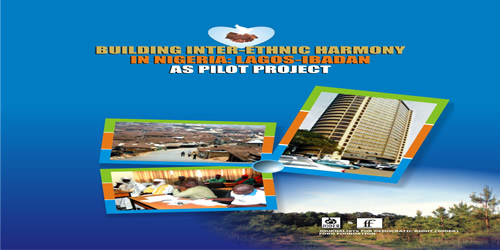FORD FOUNDATION AND JODER
Training Manual for Leaders of strategic communities
Prepared by Journalists for Democratic Rights, (JODER)
Supported by Ford Foundation, (FF)
INTRODUCTION
Living together without acrimony is a major challenge in a single society. It is even more difficult in a plural society. Ethnic violence overtime has proven to be a major challenge to the national economy, social growth and justifiable livelihood. In Nigeria, the ugly experience of ethnic-religion crisis led to the civil war which unfortunately lasted for 30 months and claimed lives.
Most of the time, disrespect for other peoples’ culture, tradition and religion, political differencesare often responsible for ethnic violence. In recent times, political differences and conflict over land resources have become critical sources of ethic feud, while lack of good governance have fuelled some of the gory situations of ethnic violence in Nigeria.
The consequences of ethic violence come to bear heavily on the ordinary people that have entrusted their future in the political class by voting for them. Impact on women and our children are enormous while the economy fortune dwindles
Target Audience
The primary targets are the members of the public. The secondary targets are leaders of major ethnic groups in Lagos and other major ethic social formations: a.) Nigerian Automobile Technicians Association, (NATA-Lagos and Ibadan branches), representatives of radical ethnic groups like the O’oduaPeoples Congress, (OPC), O’odua Liberation Movement, (OLM), O’odua nationalist Coalition, (ONAC), Nigerian Union of Road Transport Workers, (NURTW), Igbo Youth Movement, Niger-Delta ethic groups, Alaba Igbo Traders Associations, Arewa ethnic groups, middle-belt ethnic groups.
Others are state and local government authorities, police, State Security Services, (SSS), Non-Governmental Organisations, (NGOs) working in the areas of conflict, women groups, print, electronics and citizen media.
Strategic consideration
1.) Threat Analysis
2.) Strategic Approaches
3.) Endangered Personalities
4.) Institutions of Sustenance
5.) Endangered national assets.
6.) Weak Underbelly
7.) Peoples Security Consciousness
8.) Options for peaceful co-existence.
Methodology
i) The summit will be addressed by leaders of the various ethnic groups in Lagos and Ibadan most especially the vulnerable ethnic groups.
ii) The summit will last for two days. The first day focuses on the imperatives of peaceful co-existence among the various ethnic groups in Lagos with focus on managing conflict, reporting conflict in the social media and the mainstream media, mechanism for peaceful ethic relations.
iii) The second day involves technical, expert summit of leaders of the ethic group participating at the summit. The focus will be on developing the framework for specific conflict prevention and conflict management mechanism.
What the summit will achieve
i) Create greater solidarity and peaceful co-existence among the ethnic groups in Lagos.
ii) Create an interactive data of ethnic-based leaders in the state for greater understanding.
Outcome
i) Setting up of a contact committee that meets once monthly.
ii) Exchange of contacts between leaders of ethnic groups and getting to know each other better.
iii) Identification of potential flash points and mapping of such areas with the right crisis prevention mechanism.
iv) Joint statement on peaceful co-existence of the ethnic groups in Lagos and Ibadan.
v) Production of IEC material on peaceful co-existence among ethnic groups in Lagos and Ibadan.
vi) There will be production of IEC material on peace building.
vii) There will be production of book detailing event circulated among participants.
viii) Setting up of NETWORK FOR PEACEFUL CO-EXISTENCE, (NEPCOE) in the face of ethnic violence, security of lives and properties cannot be also not be guaranteed.
OBJECTIVE SUMMARY
The training manual is aimed at educating leaders of strategic groups, bothethnic and social-economic communities in Nigeria through of peaceful co-existence and how to ensure sustainable growth in Nigeria. It is aimed at imposing the responsibility of ensuring peaceful co-existence as a cardinal principle of these strategic groups.
In the manual, cautious attempts were made at identifying the salient issues inethnic relations in Nigeria with a keen provision of tips on how to prevent such ugly occurrences through practical steps and actions of individuals and ethnic or social communities.
PURPOSE OF THE TRAINING
- To provide useful information on causes of ethic discord.
- To provide useful tips on the mechanism for the prevention and management of ethnic violence.
- To ensure that the prevention of conflict emerge on top of priorities of ethnic-based associations.
- To also work out peace building mechanism as veritable instrument for peace and sustainable development.
- To provide peaceful co-existence mechanism that can be imbibed as blue print for the prevention and resolution of ethnic issues.
- It is aimed at educating the leaders of ethnic communities onthe consequences of ethnic violence.
- To create a network on peaceful co-existence.
ACKNOLEDGEMENT
Journalists for Democratic Rights, JODER acknowledges the support of the Ford Foundation which provided the funds for the programme. The organisers acknowledges participants that took part in the workshop in Lagos with a significant presence of participants from Lagos and Ibadan.
Our appreciation also goes to the leaders of ethnic nationalities through various meetings and interactions provided useful information for the production of this material.
We express our appreciations to the management and staffs of JODER who had contributed immensely to the successful production of this training manual.
MODULE 1
WHAT IS ETHNIC CONFLICT?
An ethnic conflict is a conflict is caused by the differences in the tribe or nationality of the disputants.
What other definitions do we have?
Are human beings really different from each other and in what ways if any?
Should these differences really constitute a source of disagreement between people or communities?
WHAT ARE THE CAUSES OF ETHNIC CONFLICT?
Causes of ethnic conflict can be said to be the following:
- Ego
- Political differences
- Lack of tolerance
- Religion ( Kano riot, Boko Haram)
- Manipulation by politiciansi.e elections
- Stereotyping i.e a particular nationality being stereotyped
What other causes do we have?
Reflections
Could these instances have been prevented?
From our personal differences, what are the causes of ethnic conflict?
WHAT ARE THE MAJOR ETHNIC CONFLICTS THAT NIGERIA HAS WITNESSED SINCE 1960?
-The TIV riot.
-The 1963 operation wetie in the South West
-The 1966 to 1970 civil war
-Niger-Delta crisis
-June 12 crisis
-Odi killings
-Odioma killings
What other instances of ethnic conflict do we have?
What are your views on these instances of conflict?
SOCIAL AND ECONOMIC CONSEQUENCES OF ETHNIC CONFLICT
- Security Implications: ethnic conflict has a very daring security threat on the social live and activities of any affected area. Agitations of marginalization, unequal representation and fair share of resources often led to killings and other social ills.
- Ethnic conflict often bring about a bleak future in the society as the groups will see themselves as adversaries the common good is jettisoned for what they perceived as just course.
- Underdevelopment: Schooling for children will be disrupted and interrupted; businesses will lose billions of nairaand property worth much more destroyed.
- Conflict brings wanton wastage of enormous human and material resources in ethnically inspired violent, encounters, clashes and even battles with continuous capital flight and loss of confidence in the economy.
- New armies of the unemployed, the destitute and highly aggrieved are added on the streets with its attendance consequences to the society. Victims are generally male and belonging to the economically active segment of the society.
- Ethnic conflict inflict violence, rape, lack of cooperation among people, unemployment and all sorts of violent crimes against the people and the state as a whole.
- As a result, one can safely argue that the aggregate of such instances as ethnic conflictsnegatively impact on the overall economy of a given community and by extension, the rest of the country.
KEY PRINCIPLES OF CONFLICT PREVENTION TO BEAR IN MIND
- First, is the principle of freedom.Formation of ethnic society should be allowed to flourish in accordance with the law. United Nation charter on indigenous matters gave power to eight (8) communities to become an ethnic group. Freedom of association is entrenched in the Nigerian constitution therefore, it is a basic right to form or belong to an ethnic group that share especially among others, the same cultural beliefs, language, religion and traditions.
- Clarification of conflict situations. The conflict itself is a process of communication and engagement of fields of expression, the nature and level of interests surface in the bid to achieve a new structure of expectation hence, the importance of clarifying situations that could lead to ethnic conflict and creation of an insight into a balance among the central interests at stake. Once the balancing process enjoys the support of the ethnicities, antagonism will be lessened and the resulting expectations are made more realistic by clarification of situations.
- Invocation of common objectives. The more important the objectives are, the more likely they are to help avoid or constrain mechanisms that might fuel conflict.
- Consider creation of distance in space from the other party and distance in time from conflict. It can calm emotions and facilitate a more rational perspective on the issues. This may be permanent solution to irreconcilable differences between majority and minority racial, religious, ethnicand nationality groups. As a matter of resolving protracted and violent conflict, minorities should have self-determination. For these reasons, voluntarily formed racial or cultural neighborhoods, ethnic reservations, or autonomous regions can contribute to a just peace.
MODULE 2
ROLE OF NGOS IN ETHNIC CONFLICT PREVENTION AND MANAGEMENT
Which NGOs are being referred?
- Involving NGOs in conflict prevention and management have more advantages because these organizations have local expertise and links with local actors. They are often able to gain access to areas of conflict where official representatives should not or cannot go. The warring factions generally regard NGOs as impartial humanitarian do-gooders, and this makes them effective as operating partners in peace initiatives.
- They are in a good position to give conflict early warning and advice on the best management practices of preventing an occurrence that can be detrimental to the peaceful cohabitant of the ethnic groups.
- In case of occurrence of conflict, NGOs should be seeing not taking side.
- NGOs must engage leaders of ethnic groups.
- There is also the need to lay emphasis on the importance of giving respect to culture and cultural heritage of each ethnic groups either minority or domineering ethnic group.
DETECTING AND NOTIFYING INDICATORS OF COMMUNITY DISTRESS
It is paramount for NGOs to study common interest and value of a community and identify when the value is under distress by familiar factors or unfamiliar factors. This enables timely reaction and intervention through enlightenments on the conflict indicators.
HOW TO STRENGTHEN ETHNIC CAPACITY REGARDING CONFLICT PREVENTION
- Civic engagement
- Effective elections
- Purposeful national, regional and local governance
- Formulation of people oriented policies and laws by legislatures and assemblies.
Suggestions for the government.
Suggestions for the civil society.
Suggestions for other stakeholders.


